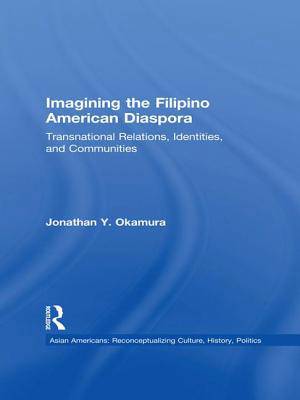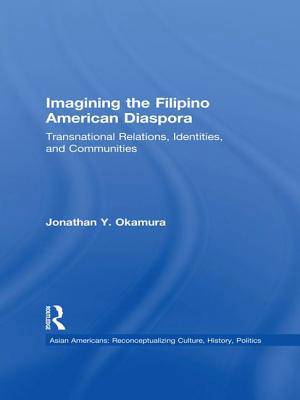
Je cadeautjes zeker op tijd in huis hebben voor de feestdagen? Kom langs in onze winkels en vind het perfecte geschenk!
- Afhalen na 1 uur in een winkel met voorraad
- Gratis thuislevering in België vanaf € 30
- Ruim aanbod met 7 miljoen producten
Je cadeautjes zeker op tijd in huis hebben voor de feestdagen? Kom langs in onze winkels en vind het perfecte geschenk!
- Afhalen na 1 uur in een winkel met voorraad
- Gratis thuislevering in België vanaf € 30
- Ruim aanbod met 7 miljoen producten
Zoeken
Imagining the Filipino American Diaspora
Transnational Relations, Identities, and Communities
Jonathan Y Okamura
€ 99,45
+ 198 punten
Omschrijving
First published in 1998. The Philippines play a major role in expanding the international Filipino community through its promotion of international labor migration-Filipinos can currently be found in over 130 countries throughout the world. As the first major work to conceive of Filipino immigration as a diaspora, this study analyses the diasporic nature of Filipino relations, identities, and communities and shows how these transnational phenomena are socially constructed by the everyday actions and activities of Filipino Americans. Instead of focusing on an ethnic minority and its relation to its host society, a diasporic perspective places emphasis on the transnational relations created and maintained among that minority, its homeland, and other diasporic communities. Transnational ties are evident in the movement of people, money, consumer goods, information, and ideas. Diaspora represents a new and fluid conceptual image quite apart from the usual coordinates based on physical location, territory, and distance. Transnational relations and practices will continue to be an increasingly important dimension of the Filipino American community because of the ongoing family-based immigration from the Philippines, further technological advances in communication and transportation, the expansion of transnational capital, and continuing racism and discrimination, all of which have made it necessary for Filipinos in the United States, the Philippines, and throughout the world to create and maintain diasporic lives and culture.
Specificaties
Betrokkenen
- Auteur(s):
- Uitgeverij:
Inhoud
- Aantal bladzijden:
- 164
- Taal:
- Engels
- Reeks:
Eigenschappen
- Productcode (EAN):
- 9781138972339
- Verschijningsdatum:
- 20/05/2016
- Uitvoering:
- Paperback
- Formaat:
- Trade paperback (VS)
- Afmetingen:
- 127 mm x 196 mm
- Gewicht:
- 199 g

Alleen bij Standaard Boekhandel
+ 198 punten op je klantenkaart van Standaard Boekhandel
Beoordelingen
We publiceren alleen reviews die voldoen aan de voorwaarden voor reviews. Bekijk onze voorwaarden voor reviews.









